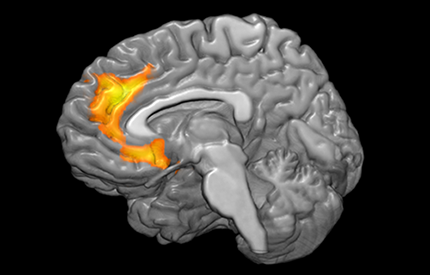Brain volume drops in patients with PTSD

Researchers at King's College London and the University of Sussex have found that the volume of various brain regions is reduced in people with Post-Traumatic Stress Disorder (PTSD). They suggest that having a small skull volume might be a risk factor for developing PTSD following a traumatic experience.
The study, published in the American Journal of Psychiatry, is the largest analysis of structural MRI scans in patients with PTSD, combining data from 89 previous neuroimaging studies. The researchers identified reductions in brain volume in a number of brain regions including the insula, anterior cingulate, hippocampus, total brain volume and intracranial volume.
Dr Kostantinos Bromis from the University of Sussex who carried out the research said: ‘Intracranial volume – the volume inside the skull – is fixed by early adolescence, and we observed reductions in intracranial volume in adults with PTSD. So it could be that having a smaller skull is a risk factor for developing PTSD, and longitudinal studies will be able to clarify this.’
Around half of patients with PTSD have also experienced major depressive disorder. To determine if the brain changes were due to depression or PTSD the researchers compared the results to patients who only had depression. The researchers found that while hippocampal volume was reduced in both PTSD and depression, only total brain volume was reduced in PTSD.
Dr Matthew Kempton, the senior author of the study from the Institute of Psychiatry, Psychology & Neuroscience added: ‘It appears that hippocampal volume may be a general marker of mental health disorders as reductions have also been shown in patients with schizophrenia and bipolar disorder.’
The researchers included data from ‘region of interest’ studies which measure a predefined areas of the brain and also ‘voxel based morphometry’ studies which survey the entire brain. They have made all the data available online as a tool for other researchers in this field.
Reference
'Meta-Analysis of 89 Structural MRI Studies in Posttraumatic Stress Disorder and Comparison With Major Depressive Disorder' by Bromis et al, American Journal Psychiatry, 2018 DOI: 10.1176/appi.ajp.2018.17111199
Contact
For further media information please contact: Robin Bisson, Senior Press Officer, Institute of Psychiatry, Psychology & Neuroscience, King’s College London, robin.bisson@kcl.ac.uk / +44 20 7848 5377 / +44 7718 697176.